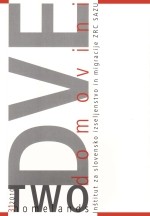Evropska unija – nova domovina za ilegalne imigrante? Študija imaginarijev Evropske unije
Ključne besede:
Evropska unija, reprezentacija, ilegalni imigranti, mediji, poglobljeni intervjujiPovzetek
Mnoge študije proučujejo reprezentacijo Evropske unije (EU), toda nobena ne analizira pogledov sodobnih Drugih na EU. Ta študija skuša zapolniti to vrzel, obenem pa s podatki, pridobljenimi s poglobljenimi intervjuji z ilegalnimi imigranti iz Afrike, razširiti postnacionalni pristop k proučevanju EU. Rezultati kažejo, da so ilegalni imigranti pred odhodom povezovali EU z ekonomskim uspehom na podlagi medijev, pripadnikov organiziranega kriminala in lažnih podob imigrantskega življenja v EU. Na podlagi izkušenj se je njihova podoba EU spremenila: Evropa je dežela represije, sodobnega suženjstva in rasizma.
Prenosi
Literatura
Accardi, Andrea (2009). Hundreds of Sudanese Refugees Living in Abandoned Train Station in Rome, http://doctorswithoutborders.org/news/article.cfm?id=942%20 &cat=field-news (24. 12. 2009).
Amin, Ash (2004). Multi-Ethnicity and the Idea of Europe. Theory, Culture & Society, 21(2): 1–24.
Antonsich, Marco (2008). The Narration of Europe in “National” and “Post-national” Terms. European Journal of Social Theory, 11(4): 505–522.
Bales, Kevin, Trodd, Zoe, and Kent Williamson, Alex (2009). Modern Slavery. Oxford: Oneworld.
Balibar, Etienne (2004). We the People of Europe. Princeton: Princeton University Press.
Banjac, Marinko (2009). (Ne)zaželeni sosed. Časopis za kritiko znanosti, 37(1): 90–101
Bauman, Zygmunt (2004). Europe: An Unfinished Adventure. Cambridge: Polity.
Beck, Ulrich (2003). Toward a New Critical Theory with a Cosmopolitan Intent. Constellations, 10(4): 453–468.
Beck, Ulrich and Grande, Edgar (2007). Cosmopolitanism. European Journal of Social Theory, 10(1): 67–85.
Bialasiewicz, Luiza (2009). Europe as/at the border. Social & Cultural Geography, 10(3): 319–336.
Brady, Hugo (2009). EU migration policy. London: Centre for European Reform.
Carrera, Sergio and Merlino, Massimo (2009). Undocumented Immigrants and Rights in the EU. Brussels: Centre for European Policy Studies.
Colombino, Annalisa (2009). Multiculturalism and time in Trieste. Social & Cultural Geography, 10(3): 279–297.
Cram, Laura (2001). Imagining the Union. Interlocking Dimensions of European Integration (Ed. Helen Wallace). London: Palgrave, 343–362.
De Haas, Hein (2008). The Myth of Invasion: the inconvenient realities of African migration to Europe. Third World Quarterly, 29(7): 1305–1322.
Della Porta, D. (2003). Forms of Europeanisation of the Public Sphere and How to Explain Them, http://europub.wz-berlin.de (24. 12. 2009).
Diken, Bülent (2004). From Refugees to Gated Communities. Citizenship studies, 8(1): 83–106.
Etzioni, Amitai (2007). The Community Deficit. Journal of Common Market Studies, 45(1): 23–42.
European Union Agency for Fundamental Rights (2009). European Union Minorities and Discrimination Survey Report, http://fra.europa.eu/fraWebsite/attachments/ eumidis_mainreport_conference-edition_en_.pdf (24. 12. 2009).
Finotelelli, Claudia and Sciortino, Guiseppe (2009). Importance of Being Southern. European Journal of Migration and Law, 11(2): 119–138.
Frontex (2009). The impact of the global economic crisis on illegal migration to the EU. Warsaw, August 2009, http://www.frontex.europa.eu/gfx/frontex/files/justyna/frontex_raport.pdf (24. 12. 2009).
Habermas, Jürgen (1998). The Inclusion of the Other. Cambridge, MA: MIT Press.
Hansen, Andreas, Cottle, Simon, Negrine, Ralph, and Newbold, Chris (1998). Mass Communication Research Methods. London: MacMillan press.
Huysmans, Jeff (2006). The European Union and the Securitization of Migration. Journal of Common Market Studies, 38(5): 751–777.
Kritzinger, Sylvia (2005). European Identity Building from the Perspective of Efficiency. Comparative European Politics, 10(3): 50–75.
Licata, Laurent, Klein, Olivier, Casini, Annalisa, Coscenza, Alessandra, and Azzi, Assaad E. (2003). Driving European Identification through Discourse. Psychologica Belgica, 43(1–2): 85–102.
Machill, Marcel, Beiler, Markus, and Fischer, Corinna (2006). Europe-Topics in Europe’s Media. European Journal of Communication, 21(1): 57–88.
Mann, Michael (1998). Is There a Society Called Euro? Globalization and Europe: Theoretical and Empirical Investigations (Ed. Roland Axtmann). London: Pinter, 184–207.
Mastnak, Tomaž (Ed.) (2001). Obrazi naše Evrope. Ljubljana: Mirovni inštitut.
Milohnić, Aldo (2001) (Ed.). Evropski vratarji. Ljubljana: Mirovni inštitut.
Minca, Claudio (2009). “Trieste Nazione” and its geographies of absence. Social & Cultural Geography, 10(3): 257–277.
Morley, David and Robins, Kevin (1995). Spaces of Identity. London: Routledge.
Neumann, Iver B. and Welsch, Jennifer M. (1991). The Other in European self-Definition. Review of International Studies, 17(4): 327–348.
Nicolaïdis, Kalypso and Howse, Robert (2002). “This is my EUtopia …”: Narrative as Power. Journal of Common Market Studies, 40(4): 767–92.
Pushed Back, Pushed Around (2009). New York: Human Rights Watch's report.
Šabec, Ksenija (2006). Homo europeus. Ljubljana: FDV.
Shore, Chris (2000). Building Europe. London: Routledge.
Smith, Anthony D. (1992). National Identity and the Idea of European Unity. International Affairs, 68(1): 55–76.
Soysal, Yasemin Nuhoglu (2002). Locating Europe. European Societies, 4(3): 265–84.
Stråth, Bo (2002). A European Identity. European Journal of Social Theory, 5(4): 387–401.
Trenz, Hans-Jörg (2002). Zur Konstitution politischer öffentlichkeit in der Europäischen Union. Baden-Baden: Nomos.
Velikonja, Mitja (2005). Evroza. Ljubljana: Mirovni inštitut.
Waley, Paul (2009). Introducing Trieste: a cosmopolitan city? Social & Cultural Geography, 10(3): 243–256.
Zavratnik Zimic, Simon (2001). Perspektiva konstruiranja schengenske “e-meje”: Slovenija. Evropski vratarji (Ed. Aldo Malohnić). Ljubljana: Mirovni inštitut, 67–82.
Prenosi
Objavljeno
Kako citirati
Številka
Rubrike
Licenca

To delo je licencirano pod Creative Commons Priznanje avtorstva-Nekomercialno-Brez predelav 4.0 mednarodno licenco.
Avtorji jamčijo, da je delo njihova avtorska stvaritev, da v njem niso kršene avtorske pravice tretjih oseb ali kake druge pravice. V primeru zahtevkov tretjih oseb se avtorji zavezujejo, da bodo varovali interese založnika ter da bodo povrnili morebitno škodo.
Podrobneje v rubriki: Prispevki





